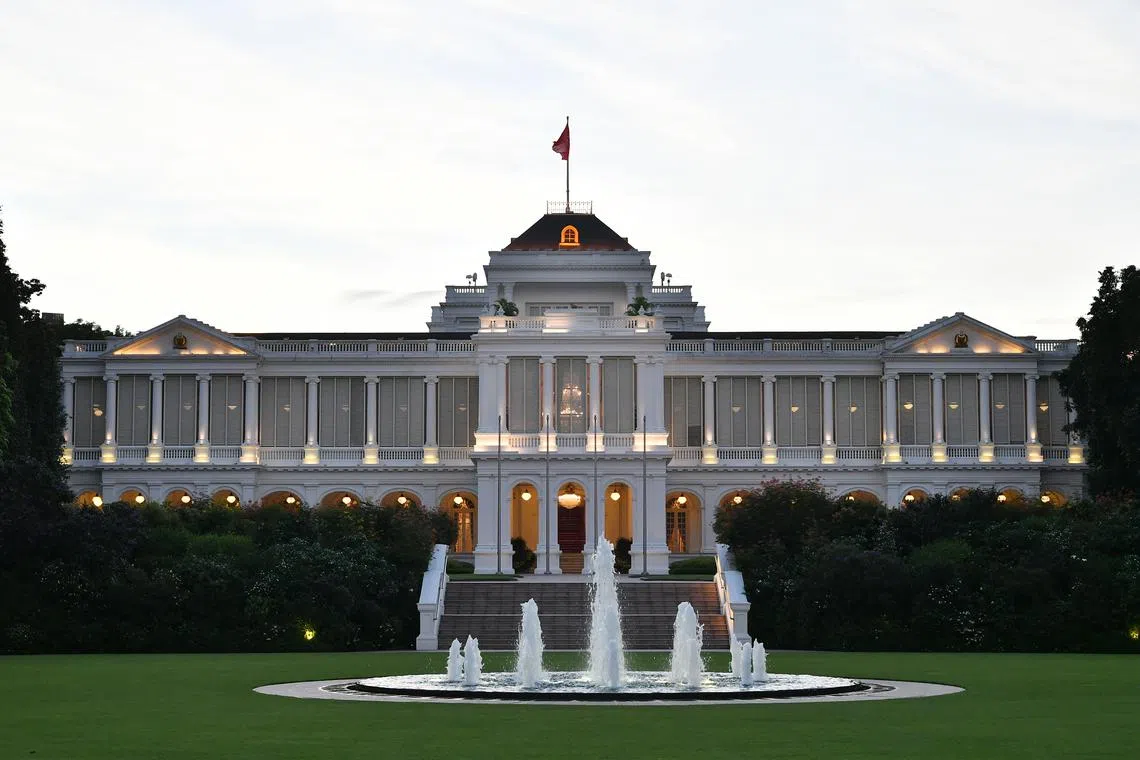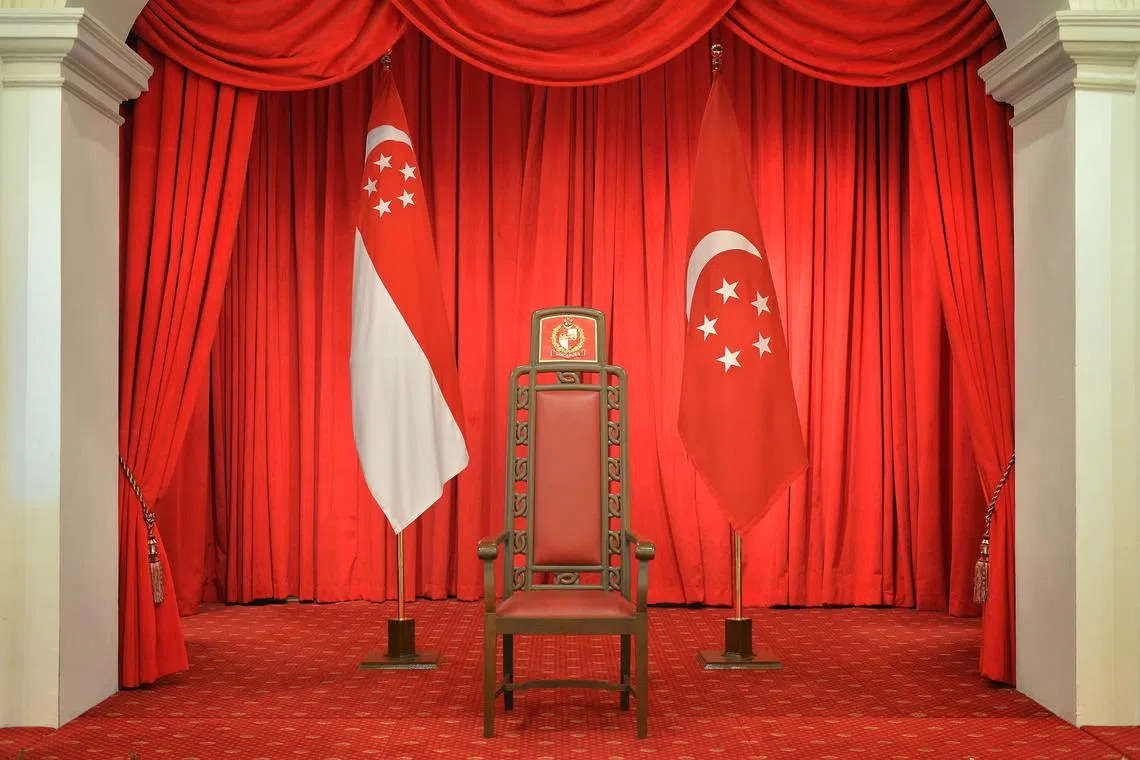askST: What happens next as Singapore gears up for the upcoming presidential election?
Sign up now: Get ST's newsletters delivered to your inbox

The election, which is held every six years, has to be called before Madam Halimah Yacob’s term ends on Sept 13.
PHOTO: ST FILE
Follow topic:
SINGAPORE – With President Halimah Yacob’s announcement on Monday that she will not be standing for re-election,
The election has to be called before Madam Halimah’s term ends on Sept 13.
The Straits Times answers questions about what happens next as Singapore gears up to elect its ninth president.
1. When will the election be held?
The election, which is held every six years, has to be called before Madam Halimah’s term ends on Sept 13.
Under the law, the presidential election must be conducted not more than three months before the incumbent’s term expires.
If the office of the president becomes vacant before the incumbent’s term expires and there is no writ of election issued yet or one has been revoked, the poll must be held within six months from the date in which the office was vacated.
In the 2017 election, the Government scheduled the polling date after President Tony Tan Keng Yam’s term expired on Aug 31 that year.
Then Minister in the Prime Minister’s Office Chan Chun Sing said then that the adjustment was made given changes that slightly extended the election process. This was to avoid having the presidential election campaigns held during National Day celebrations.
A writ of election was issued on Aug 28, 2017, with Nomination Day on Sept 13 and Polling Day on Sept 23. Madam Halimah was eventually elected unopposed and was sworn in on Sept 14.
At the time, Mr Chan said the Attorney-General had advised that there could be an interval between when the incumbent’s term expires and when the new president assumes office.
The Constitution provides for an acting president until a new one is elected and takes office. Mr Chan said the period in which the acting president shall exercise the functions of the office of the president should not exceed one month.
In 2011, Nomination Day was on Aug 17 and Polling Day on Aug 27. Dr Tan was sworn in on Sept 1, a day after his predecessor Mr SR Nathan’s term of office expired.
2. What is the process leading up to the actual polls?
Picking up of forms:
The next step is for potential candidates to pick up their forms from the Elections Department (ELD) website or office.
Aspiring candidates must apply for two certificates: a certificate of eligibility, and a community certificate declaring them a member of a specific community.
In past elections, these forms were typically made available around three months before the incumbent president’s term expires, which suggests that potential candidates could pick up their forms for this election around June 13.
While the upcoming election is open to candidates of all races, a community declaration is needed to determine when the next reserved election will be held.
Writ of election:
Prime Minister Lee Hsien Loong will issue the Writ of Election next.
Once this happens, ELD will announce the date, time and place of Nomination Day as well as when Polling Day will be.
Nomination Day:
On Nomination Day, prospective candidates must present their nomination papers and certificates to the returning officer at the nomination centre between 11am and noon.
If only one candidate is successfully nominated, the returning officer will declare the nominated candidate elected as president. This is what happened in 2017, when there were three presidential hopefuls but only Madam Halimah was eligible.
Campaigning:
If there are multiple candidates, campaigning will begin immediately after the conclusion of the nomination proceedings till the start of Cooling-off Day, which is the eve of Polling Day.
Polling Day:
On Polling Day, eligible voters can cast their votes between 8am and 8pm. After polls close, the ballot boxes will be transported to the counting centres. The returning officer will announce the outcome of the poll on completion of count.
The return envelopes containing postal ballot papers and ballot boxes containing ballot papers cast at overseas polling stations will be sent back to Singapore for counting after Polling Day.
If the total number of overseas votes is smaller than the difference between the number of local votes polled for the top two candidates, the returning officer will declare the candidate who received the highest number of votes the winner.
Otherwise, the number of votes cast for each candidate will be announced, but the declaration of who is elected will be deferred till overseas votes are counted.
3. Who qualifies as a candidate?
To qualify, a presidential candidate must be a Singapore citizen aged 45 and above on Nomination Day, and have lived in Singapore for at least 10 years up to that date.
He or she must not be a member of any political party on the date of nomination, among other criteria.
The candidate must have met the public- or private-sector service requirement within the last 20 years.
The public-sector service requirement

A presidential candidate must be a Singapore citizen aged 45 and above on Nomination Day, and have lived in Singapore for at least 10 years up to that date.
PHOTO: ST FILE
To fulfil the private-sector requirement, a person must have served as chief executive of a company for at least three years, during which time the company must, on average, have at least $500 million in shareholders’ equity and made profit after tax throughout.
The Presidential Elections Committee (PEC) must also be satisfied that the person has the experience and ability to effectively carry out the functions and duties of the office of president.
The PEC also can exercise its discretion and give potential candidates the green light even if they do not meet the private or public sector requirements.
In 2011, the PEC allowed Mr Tan Jee Say to run although he did not meet the private-sector candidate requirements.
Apart from satisfying the relevant public- or private-sector requirements, candidates must also satisfy the committee that they are “a person of integrity, good character and reputation”.
4. What is the role of the president?
The Constitution clearly defines the role and scope of the president to have custodial powers, but not executive ones.
Discretionary powers
He or she can veto or block government actions in specific areas such as the protection of past reserves, appointment of key personnel, Internal Security Act detentions, Corrupt Practices Investigation Bureau investigations and any restraining order in connection with the maintenance of religious harmony.
The Council of Presidential Advisers (CPA) advises the president on the use of such discretionary and custodial powers. The president must consult the council when exercising powers related to all fiscal and appointment matters.
Non-discretionary powers
On all other non-discretionary matters, the president must act in accordance with the advice of the Cabinet, or a minister delegated with that power.
The president will meet the prime minister regularly to discuss a wide range of issues and share his or her views, though such discussions are kept confidential.
In addition to constitutional duties, the president also has ceremonial and community-related ones.
For example, he or she presides over the National Day Parade, opens each session of Parliament and officiates at swearing-in ceremonies of key appointment holders such as the prime minister, Cabinet ministers, chief justice and Supreme Court judges.
The president also supports various causes, including volunteerism, social entrepreneurship, sports, culture and the arts. This could be through the President’s Challenge, or the various awards that the president lends his or her name to, such as the President’s Scholarship or President’s Award for Teachers.
5. What do you need to do as a voter?
With the election coming up, ensure that you are eligible to vote.
If your name has been struck off the Register of Electors for not having voted in a previous election, you may apply via the Elections Department website to restore your name.
No restoration can be made once the Writ of Election has been issued.
Voting is compulsory for all Singapore citizens aged 21 and above who have not been disqualified from being an elector.
If the election is contested, voters will receive their poll cards by post at their registered residential address, two to three working days after Nomination Day.
On Polling Day, bring the poll card and NRIC to the polling station indicated on the poll card.
6. What’s new for this upcoming election?
The upcoming election will see two new initiatives to allow for smoother voting and to also take into account the ageing population.
If there is a contest, the 2023 presidential election will be the first time postal voting is allowed.
Overseas Singaporeans who have registered for postal voting
These envelopes must be postmarked before Polling Day in Singapore and reach the custody of the Returning Officer in Singapore no later than 10 days after Polling Day.
The election will also see a pilot in about 25 to 30 nursing homes, where polling stations will be set up on site, or mobile polling teams will be deployed to take ballot boxes and papers to bed-bound voters.


